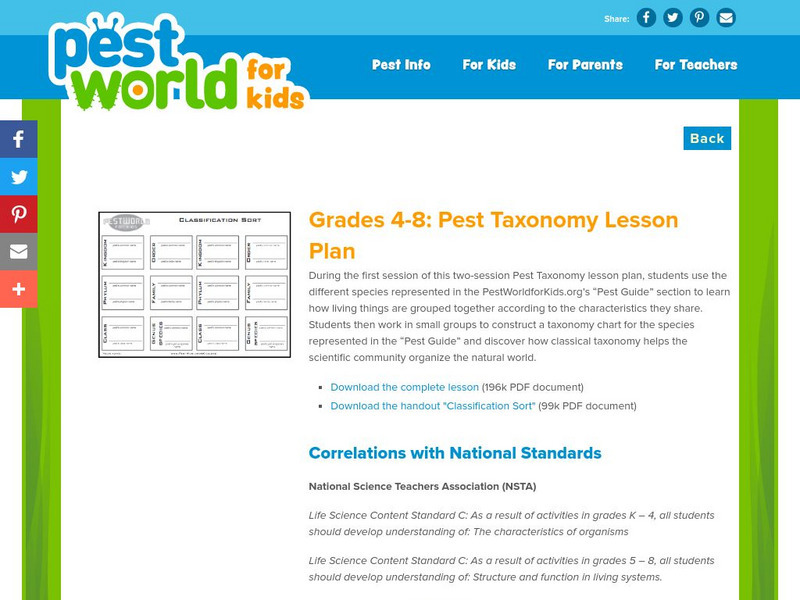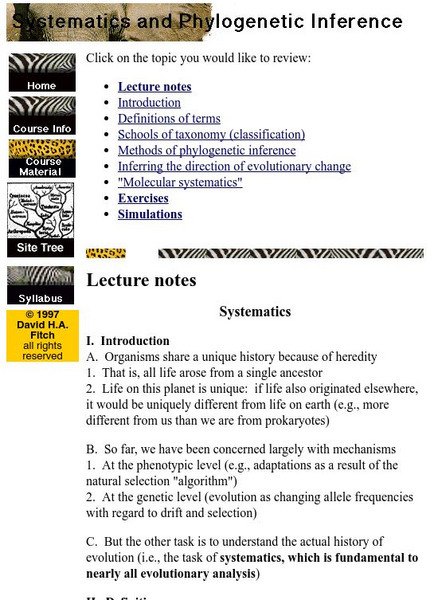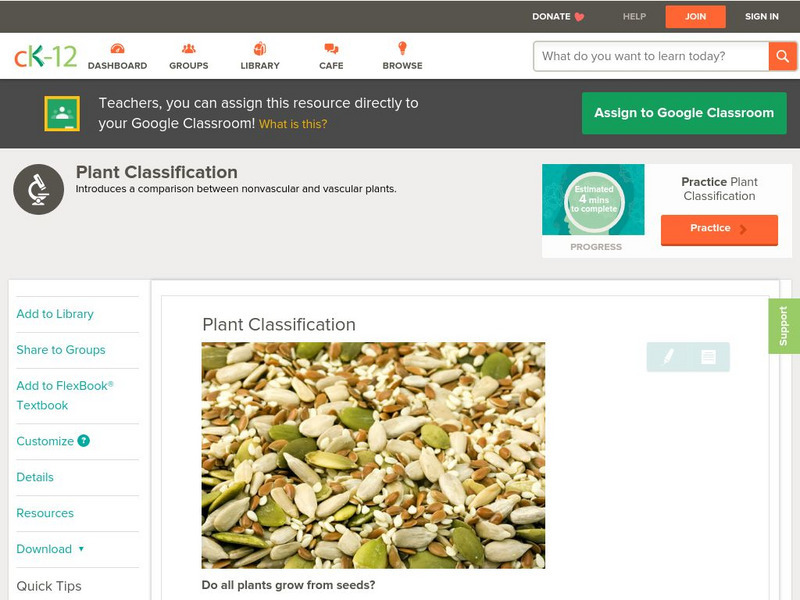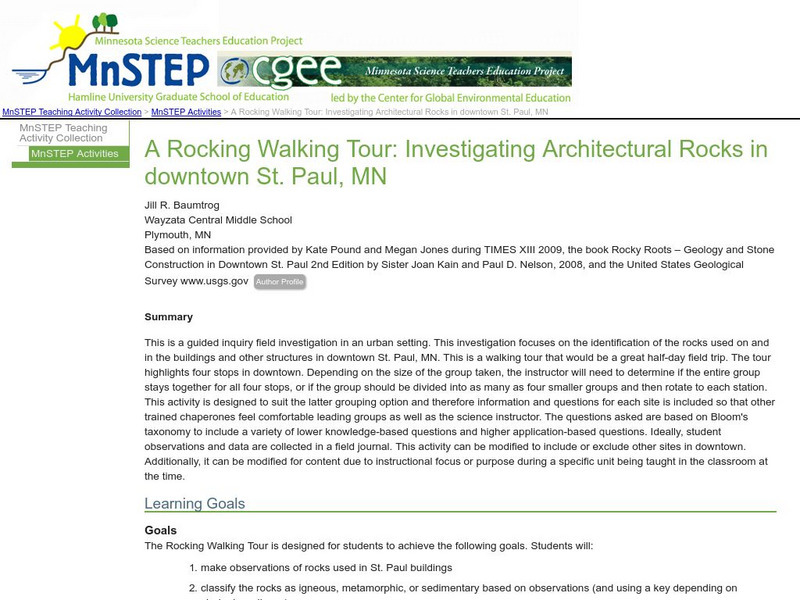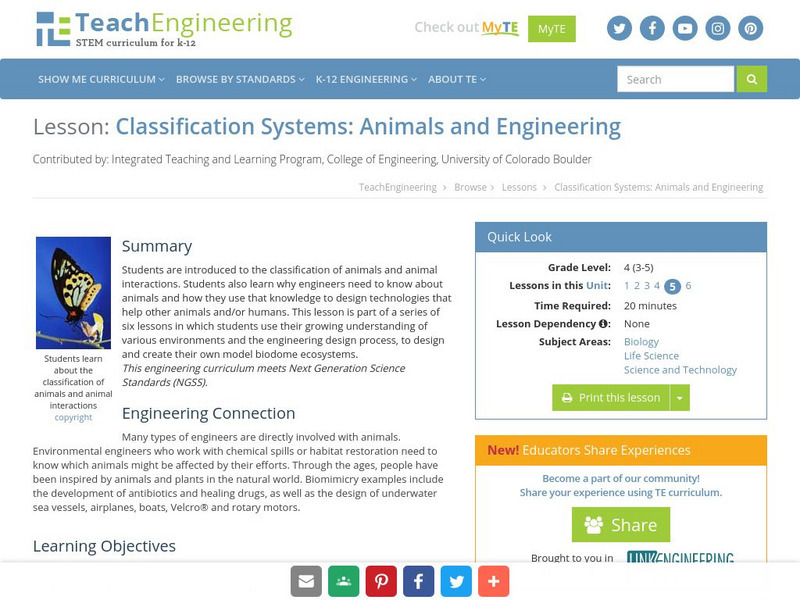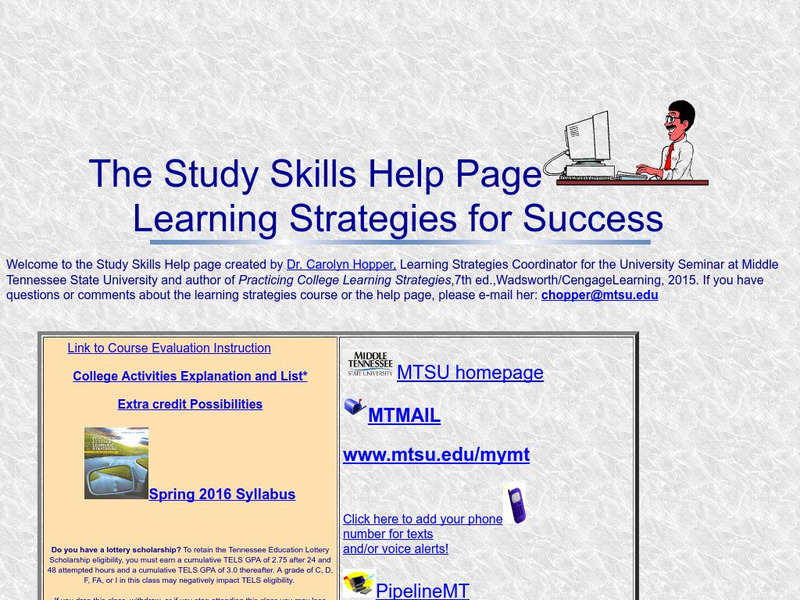University of Oregon
Computer Based Assessment: Taxonomy Table
This website introduces a taxonomy or categorization of 28 innovative item types useful in computer-based assessment. The taxonomy describes "intermediate constraint" items. These item types have responses that fall somewhere between...
Alabama Learning Exchange
Alex: Taxonomy: The Importance of Classifying
This is a technology-based, hands-on Biology lesson used to introduce the topic of Taxonomy and the importance of classifying. Students will listen to a podcast about classifying every living thing on Earth. Students will then give some...
National Pest Managment Association
Pest World for Kids: Pest Taxonomy
During the first session of this two-session lesson, students use the different species represented in the PestWorldforKids.org's "Pest Guide" section to learn how living things are grouped together according to the characteristics they...
Texas Instruments
Texas Instruments: Taxonomy
This StudyCards stack enables students to review the vocabulary used in studying taxonomy.
Tree of Life Project
The Tree of Life Web Project
The Tree of Life is a multi-authored, Internet distributed project containing information about phylogeny and biodiversity. The Tree of Life can be used to locate information about a particular group of organisms through their taxonomy.
New York University
Classification
These lecture notes describe the techniques used in traditional systematic classification systems and compare them with the most modern approaches to classification.
National Institutes of Health
National Center for Biotechnology Information: Phylogenetics Factsheet
A detailed website that explains the history and process of classifying animals using evolutionary, molecular, and physical characteristics relationships. Website also contains information on evolution and evolutionary processes....
CK-12 Foundation
Ck 12: Life Science: Plant Classification
[Free Registration/Login may be required to access all resource tools.] Do all plants grow from seeds? No, there are actually a few plants that do not make seeds. Whether or not a plant makes seeds is one criteria used to classify...
Other
Byrdseed: The Differentiator
An interactive planning tool for teachers to develop differentiated lessons based on the revised Bloom's Taxonomy. Choose a thinking skill, then the type of content, the resources that will be used, the product students will produce, and...
University of California
Cladistics Notes [Pdf]
Describes readings associated with lecture notes on cladistic classification. Provides definitions of many key vocabulary words used with cladistics.
Other
Alice Ferguson Foundation: Bridging the Watershed: Plant Identification
Use this interactive guide to identify plants based on their leaves. For each step, you are given two choices, and you continue down the branches until you discover a plant's name.
Science Education Resource Center at Carleton College
Serc: Using Inquiry to Group Minnesota Critters
Students will observe and investigate various characteristics of Minnesota critters, and then chart and give reasons for the way they grouped them.
Alabama Learning Exchange
Alex: A Comparison of Puritan Authors
This lesson is meant to directly follow "A Comparison of Puritan Authors and Their Viewpoints on God and the Devil." Young scholars are introduced to the basic concept of Bloom's Taxonomy of Knowledge, and then asked to apply the...
Science Education Resource Center at Carleton College
Serc: A Rocking Walking Tour: Investigating Architectural Rocks in St. Paul, Mn
This is a guided inquiry field investigation in an urban setting. This investigation focuses on the identification of the rocks used on and in the buildings and other structures in downtown St. Paul, MN. The questions asked are based on...
Other
Center for Assessment: Little Red Riding Hood & Cognitive Rigor [Pdf]
A cognitive rigor chart using the revised Bloom's taxonomy highlighting different levels of learning experiences relating to the story The Little Red Riding Hood.
Biology Pages
Kimball's Biology Pages: Cladistics
This page discusses how the cladistic level of classification includes information from molecular biology to establish evolutionary relationships. The page discusses how this information is used to do this.
TeachEngineering
Teach Engineering: Animals and Engineering
Students are introduced to the classification of animals and animal interactions. Students also learn why engineers need to know about animals and how they use that knowledge to design technologies that help other animals and/or humans....
Wikimedia
Wikipedia: Binomial Nomenclature
Wikipedia, an open-source encyclopedia, offers great information on the classification system used in Biology. Covers the benefits of the system, history, and general information on the whole system together.
Other
Math and Science Activity Center: Classification of Living Things
Kingdom is the highest rank used in the biological taxonomy of all organisms. There are 6 kingdoms in taxonomy. Every living thing comes under one of these 6 kingdoms. The six kingdoms are Eubacteria, Archae, Protista, Fungi, Plantae,...
CK-12 Foundation
Ck 12: Life Science: 11.9 Organization of Living Things
Learn the system that scientists use to classify living things.
Alabama Learning Exchange
Alex: Botany Scavenger Hunt Where's the Ginkgo?
Students use a science nature journal to log in plants native to Alabama. They sketch pictures of leaves, identify the special characteristics of the plant, and describe the environment where it was found. They also research special...
Utah Education Network
Uen: Classifying Objects
Fourth graders practice using a type of classification system.
San Diego Zoo Global
San Diego Zoo: Reptiles
What is a reptile? Use this resource to understand the basic facts of all reptiles and click to detailed information on many specific types.
Other
Tennessee State University: The Study Skills Help Page
The Study Skills Help Page provides learning strategies for success. Explore the learning tools and tips that you can use to become a more skilled learner.


